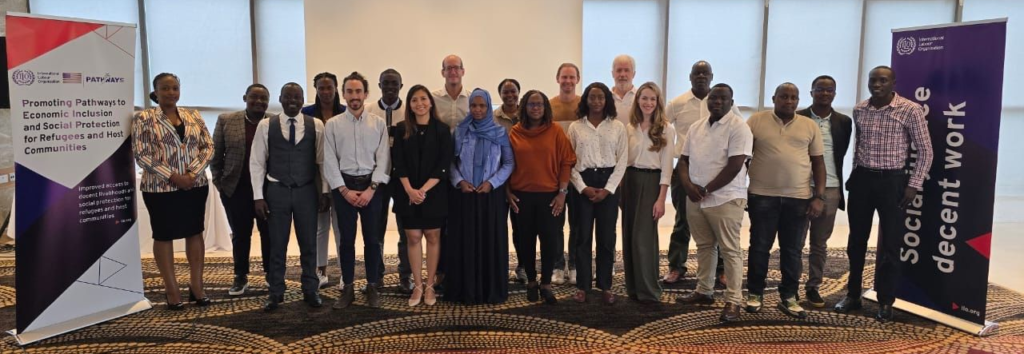By Chris Maclay
This is part 3 of a 3-parter on global demand. It looks at an innovative business model for Africa’s growing demand for ICT services. Part 1 explores why employment interventions and jobtech platforms must tap into global demand to create meaningful jobs for Africa’s growing labour force and Part 2 examines why the Jobtech Alliance’s systems change approach necessitates intervention to grow global demand for African talent.
My great-grandmother was the first woman accepted into the Scottish magic circle. Alice in Conjourland was her stage name. My dad, who spent every summer living with her in Glasgow, would tell stories of her magic tricks. Pulling rabbits out of hats. Making books disappear. And the star of the show: turning an old boot into a chocolate cake. She had an amazing skill.

Above: Alice in her prime
But turning that skill into a meaningful livelihood wasn’t easy. Marketing her trade, administering bookings, managing finances and magician assistants (when her son wasn’t around to do it for free), and then being up on stage when the lights came on. That’s not even to mention the social challenges she faced as a single mother in a male-controlled entertainment industry. Great Grandma Alice was one of the original hustlers, but she struggled to manage all the competing challenges as a business. Eventually, she gave up on the world of magic, completely broke, and all she left behind in the magical realm were some great stories and smelly chocolate cakes.
Great Grandma Alice’s challenge was that it was really hard to be good at everything. Raw technical talent is a remarkable skill. Selling is another. Business administration is another yet again. How can we expect one person to be good at all those things?
The same can apply to entire businesses. Building jobtech platforms in Africa almost always requires being equally brilliant at solving supply-side issues (skills gaps, supply chain inefficiencies) and demand-side issues (innovative product packaging sales in global markets). It’s hard to do all of that well.
But why does one platform need to solve everything? Not only is it hard to scale a business that does a hundred things, but one organisation might not be well-placed to solve everything.
Selling to global demand: like pulling a rabbit out of a hat
A few months ago, we wrote in our newsletter about the need to ‘move out of single-player mode’ and build more collaborations with other jobtech platforms. A collaboration could leverage one platform’s training model and another’s customer-facing product, for example.
We’ve observed one specific reckoning of this phenomenon emerging over the last year or so. In digital work agencies in the ICT outsourcing sector.
As we wrote in part 2 of this blog series, the most critical constraint to the growing employment of African ICT talent is a lack of connection to global demand. The current operating model of BPOs and digital work agencies is to recruit, vet, train, and manage talent and projects in Africa, lead on sales with global clients, and manage day-to-day projects and accounts. Sounds great, doesn’t it? The only problem is that it starts sounding like Great Grandma Alice.
In particular, when we consider that sales are typically done face-to-face in Silicon Valley or other major cities, many incredibly talented African ICT professionals with no existing connections in those markets will likely be disadvantaged. Of course, larger companies can build out global sales teams – for example, one leading Africa-focused ICT outsourcing firm has over 100 sales and customer success team members in global markets – but is each African digital work agency equipped to build a global sales team?
What would multiplayer mode look like in this context? We think there is a significant opportunity to ‘split’ the traditional agency, with some companies focused on sales and account management, likely based in source markets, and others focused on talent management and service delivery in Africa.
It is a phenomenon we’ve been trying to nudge for a good year. Then last week, we saw many thoughts converging around the topic at a workshop that we co-hosted with the International Labour Organization’s Pathways project focused on creating digital work opportunities for refugees. The workshop participants were co-creating the most viable ‘pathways’ for digital work among refugees, and each of the independent groups ended up designing something that looked like this:
This model, incidentally, is that of the Jobtech Alliance venture support platform, EqualReach. With a founder based in the UK, the platform is focused on selling ICT projects delivered by refugees to impact-oriented companies. It then distributes this work to digital work agencies or ‘delivery partners’ in Africa, which are either refugee-led or refugee-serving, responsible for project delivery. EqualReach identifies and vets this community of delivery partners and conducts overall quality control, but delivery and the first layer of quality control is done by the delivery partner.
We believe that this model has significant potential to overcome the disconnect between global demand and African ICT talent, and we are interested in different models that could serve the function of sales and account management. This could be done through commercial entities like EqualReach, collaboration or cooperative models between delivery partners, utilizing more traditional brokers, or more. If you’re in this space, please let us know. If not, please start exploring it.
It is hard to do everything. But we have the opportunity to collaborate like Great Grandma Alice never did. If we do, we could rapidly accelerate the connection of young ICT talent in Africa to well-paid work with global clients. Now that’s magic.

Above: Everyday I’m workshoppin’
The author is the Program Director for Mercy Corps at the Jobtech Alliance.

0 Comments